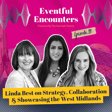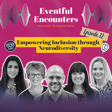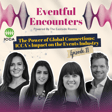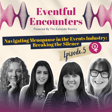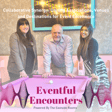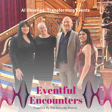Become a Creator today!Start creating today - Share your story with the world!
Start for free
00:00:00
00:00:01

From Destination Strategy to Association Success: Unlocking Event Opportunities
This month, Leanne and Tanita catch up with association event professionals, Kate Sargent and Julie Watterston. Following a month where The Eastside Rooms revealed record breaking success in this key sector, Leanne and Tanita wanted to explore the many ways venues and destinations can do even more to succeed with their association clients.
Transcript
00:00:05
Speaker
Hello and welcome back to Invent from Encounters. I'm Tanita, the marketing manager here at the Eastside Rooms. Hi, I'm Leanne, the director of Sales and Marketing here at the Eastside Rooms too. um So today's episode is From Destination Strategy to Association Success, Unlocking Event Opportunities.
00:00:23
Speaker
So we're going to explore how venues like ours can better serve and attract association events. We want to dive into strategies, challenges, and opportunities in the ever-evolving landscape of associations business. With insights from leading experts in our field, whether you're an event planner, a venue operator, or part of an association, this episode will offer valuable takeaways to help you unlock new event opportunities. So let's get started. And today we're joined by two amazing guests. We've got Julie Washington from Washington Associates,
00:00:53
Speaker
who specialise in international association research and sales and development, and Kate Sargent, enterprise director from Bioscientifica, an association aiming to strengthen biomedical communities to advance science and health. I think I introduced you both correctly there. If there's anything you want to add, feel free. You did. Yeah, you absolutely did. um It's probably worth just saying at this point that Bioscientifica is a conference agency. but we are owned by the UK Society for Endocrinology, which is an association. So I wear i can wear two hats, so I can have the in-house association view, but also the view from the from the professional conference organisers and venue bookers as well. Which is exactly why we invited you Kate.
00:01:40
Speaker
and on job Shall I just add to that? um I'm Julie Watterson. My company is Watterson Associates. I've had a relationship with Leanne and Tanita working with the East Siderooms for quite some time now and Kate and I know each other through the meetings industry. So my company, Watterson Associates, is a destination representation company and we specialise primarily in securing more international association Congress business for our
00:02:11
Speaker
clients who are predominantly venues and convention bureaus. you Amazing, thank you. So, and just to kick things off, as a venue we're starting to see quite evolving trends in the conference and events and events industry, as a base as I'm sure you both are as well, but especially with the association events. so From your perspective, how have attendee expectations shifted in recent years, especially kind of post pandemics? We've seen you know huge changes in our industry since the pandemic. And what do you think the venues perhaps need to do to better accommodate the unique needs of the association events in this new landscape?
00:02:52
Speaker
sure when i obviously I obviously see this from a venue and destination perspective and and kate as the client may see it differently, so it will be interesting to see if we still have the the same views. But I found that immediately post-pandemic,
00:03:07
Speaker
Obviously there were lots of virtual meetings and then they moved to a hybrid model and then the word on the ground was that this may well be the new way forward. However, I found since then that people do genuinely prefer to meet in person, they get a lot more out of that networking aspect. And while some associations still have a hybrid model,
00:03:31
Speaker
the majority, I feel, are now turning again to imperson only, possibly with some streaming or recording of sessions. um But the association market has always been hugely influenced by world events, whether it's a pandemic or the Russia situation or, you know, years ago, there was bird flu. But on the plus side, um yeah We all know that associations have to meet on a regular basis as outlined in their bylaws. So if they're on a three or four year rotation, these events are hopefully not as disrupted um because things will potentially change by the time their Congress comes around. But yeah, on the whole, I think we are pretty much back to in-person events now with an element of vibratory.
00:04:22
Speaker
that. Yeah I do remember um during the pandemic when everyone was like events are all going to be virtual and then obviously as an industry that was quite concerning but actually there's just nothing like in-person events and I think especially with associations when you're kind of seeing like great minds coming together and you know those people that are together perhaps not even and annually but it could be bi-annually or every few years you know it's so important that they meet in person and share best practice and share you know what's happening in different parts of the world that I just think and you know live events will always be the best way forward. and And some of those discussions and those important discussions are the ones that are actually made
00:05:07
Speaker
in the line for coffee at Coffee Break or over lunch, which obviously is is is just nowhere near possible with a with a virtual meeting. Definitely. So how have you found it, Kate? So during the pandemic, did you do a lot of events virtually or do you still have an element of kind of doing virtual or hybrid events as well? Yeah, so um on the 24th of February 2020,
00:05:34
Speaker
the pandemic became my full-time job because at that point, even though that was a good two to three weeks before the government made, you know, nationwide announcements about lockdowns and things, that was when we realised this was going to be a really serious problem for all of the meetings that we were organising. And at that time we had UK but also European um meetings on the schedule for, you know, and Julie will know this, the the booking life cycle of a meeting for an association, you were just talking about you know the the and rotation of the meeting life cycle, but actually we're booking meetings four, five, six years in a advance, primarily to ensure that we can secure the venues that are required because We all know that we have a busy season in the spring and a busy season in the autumn. Nobody meets anybody in July and August and Christmas is a nightmare. So we know that stuff. But actually you were just talking about kind of the impacts of the pandemic. And even now we are still seeing the knock on impact of people having to move their meetings. I am still dealing with the paperwork from moving meetings in 2020 to 21. that then had a ah domino effect, yeah venues that we've got in play even now in 24, 25, 26 and indeed 27. So we're still dealing with that side of it. In terms of the kind of changing trends, we are absolutely 100%. I completely agree with what's been said around
00:07:13
Speaker
um the technology. And yes, we all thought that hybrid and and online virtual meetings was going to be a complete industry changer. And the events industry took a leap of about 10 years and about 10 weeks in in early to mid 2020. We'd been putting it off for a decade at least.
00:07:32
Speaker
However, what happened was that we took all of the advantages and all of the really good stuff that has come from being able to meet virtually. When I was invited to talk to you today, I didn't give a second thought that I'd be sent some software that I'd never used before and I'd jump on screen. And you just, that becomes- Yeah, it's become the norm, hasn't it? It's become the norm, but what we're seeing, and what you were speaking to already,
00:08:01
Speaker
return to in-person meetings. We've certainly made it our strategy here with our own events is we're not doing virtual meetings. We can, we can support our clients and we can do, you know, live streaming and on-demand and meeting content. But what we're seeing here is is that it's back to in-person and we are looking for the ability to have that flexibility around from a technological point of view, from venues around Can we record? Yes, it's it's not all about live streaming because that's prohibitively expensive most of the time. And in all honesty, people aren't signing up and watching it in the moment that it's being presented when we're on site. It's usually a webinar, isn't it, that people backate and Yeah. And it's also the massive, massive shift that we've seen from a from an association point of view for our own meetings, but also for our clients is the delegate booking trends. They are booking later.
00:08:56
Speaker
Yeah,
00:08:58
Speaker
yeah so we are having such less certainty around delegate trends and the numbers and is it going to be a viable meeting, not just, you know, financially, but also for the people in the room and the experience that they're going to be having. And how are you adapting your approach to kind of be able to counteract that? Obviously, you're not knowing how many delegates you're going to have. How are you getting around that?
00:09:21
Speaker
So we are absolutely having to work with our venues on flexible terms, so minimum numbers and cancellation terms. We need more flexibility. The venue contracts that were built and designed pre-pandemic, just no longer fit for purpose. and And that's the reality of it. We've got to be honest about our experience and work in partnership with our venues so that we can you know offer, if if we're stuck in a position where we can't make ah a financially viable decision because the delegate numbers haven't come through, but we know they're all going to book five minutes before, it doesn't help us because we'll just end up cancelling the event and and everybody loses out, you know, the delegates are primarily. So it's around flexibility. It's about flexible space. It's about flexibility in the terms that we're using.
00:10:15
Speaker
And, you know, we've got flexibility in that technology is really key. I think you've really touched on a good point there, actually, Kate, because I was reading, I was actually doing, we're in September, so of course it's budget prep season, isn't it? So I was reading everything, sin every article that was possible in the events industry to try and gauge what 2025 was going to be like. But one of the biggest points that kept coming up was all about delegate registration. So it kept saying that delegates are Registering later for events which were definitely seen as a venue you know are um numbers for conferences and events from associations and actually even from corporate can jump significantly kind of just a couple of weeks out which
00:10:58
Speaker
historically wouldn't have numbers would never have increased by that many. and And then another trend that we saw is that people are kind of more reluctant to go to her events now. So whereas people would have been more willing to go to lots of conferences and lots of events are kind of more picky now about the events that they do choose. So a trend that I've kind of seen with ah working with the associations is that actually, you know, associations are having to be cautious with their planning because exactly like you said, they're kind of booking years in advance. So I've actually been in conversation with an association booking that we're working on at the moment ah for in four years time and this week. And what we've had to do is kind of look at um their numbers and they're taking a cautious approach to kind of planning that event.
00:11:49
Speaker
in the hopes and probably, you know, they're pretty certain that their numbers will um jump up closer to the event, but kind of this far out, they are having to be cautious on the numbers and how many delegates they're pre-booking for. So that is definitely and a trend that we're seeing across the board. so that you pulled that up But how are you kind of... um I guess it's very difficult, isn't it? Because if you if you're not sure how many delegates you're going to have,
00:12:19
Speaker
What do you do as regards booking the space at the venue because does that mean that you have to, you know, does it mean you have to predict the number you're going to have or does it mean that you provisionally have to book more space and potentially you're going to need and then maybe there's a financial implication on that? From our experience, it is about being more prudent So we will set our delegate numbers for what we would expect to be a 150 person meeting. We will book for 70 or 75, literally whatever the minimum we can with the venue. And that's that's not a ah comfortable position to be in. You know, we want to be ambitious and we want to secure that um delegation and that number. But we also need to be really realistic about
00:13:11
Speaker
the reality of if we book for that number and the venue has another um booking and can't then accommodate any sort of scaling up, well then that's our reality too and we have to accept that. I think for us it's all about kind of keeping the lines of communication open. So what we're making sure we're doing is speaking to the associations regularly or even, you know, our corporate bookings as well. And if we, they're being transparent with us as well, which I think helps where they're kind of saying, you know, we are being cautious on the numbers that we're expecting delegations ah the delegate registration to be.
00:13:44
Speaker
the they'll give us an x number but then they will say you know it could increase by a certain amount so we have that kind of in the back of our minds and then it's just keeping those lines of communication open so that exactly that if they need to expand their event where we've hopefully got the space to then be able to work with them to expand it too but equally if they are anticipating that their numbers may drop or may be lower that we then are kind of being savvy with our space and making sure that we're not holding out for numbers that might not materialise. I'm juggling that. So moving on slightly to destination strategy. Judy, can you explain how a strong destination strategy can make a venue more appealing to international associations? kind of What key elements should venues focus on and to enhance their appeal?
00:14:36
Speaker
Yeah. i'm Obviously, international associations come from lots of different sectors, so it can depend on what sector they're from as to what the biggest appeal is for them. But I think the most important thing going forward is that venues and destinations sort of need to ensure that any bid that they submit to hopefully win the business so replies directly to the call for bids and includes full destination information,
00:15:08
Speaker
um invitation letters from key city stakeholders, um you know, very specific information about the event rather than just generic information. I mean, I've seen so many times that a venue has asked an association what they need for their conference and what the requirements are. And the association may say, well, we don't we don't have an exhibition, for example. And then the venue includes in their bid all information about their exhibition space.
00:15:37
Speaker
So, you know, it's completely useless and in most cases that that would just sort of be cast aside. um I think a really important thing going forward, and this has been the case obviously for quite some time, is that we really do need to make friends with local academics. They're nearly all affiliated to international associations and they might not even realise that they can influence a decision on where to hold a future Congress. So that relationship building going forward is key, not just with the local academics and the local association members, but also for the venues with their convention bureaus, for example, so that you can really put together a comprehensive bid. Yeah. It really is an industry based around relationships. I think that's what I'm kind of picking up on here. and Yeah, absolutely.
00:16:32
Speaker
With competition among destinations being so high, what kind of strategies would you suggest that would put forward to make us more successful, more attract more attractive to these international associations?
00:16:46
Speaker
You know, it's the association business is that it's a long-term process. And destinations and foundations... Don't we know it? Yeah, short-term, medium-term and long-term strategy.
00:17:01
Speaker
And so to be absolutely honest, I don't think some venues and destinations actually understand that long-term strategy and the huge value of um international association business. I mean, I've seen so many venues where maybe they have a new CEO who comes on board from other parts of the industry and just wants easy wins and short-term corporate business and really doesn't understand the longevity of it all. You know, the the economic impact, the kudos, the legacy that can be achieved from an international association.
00:17:32
Speaker
conference. um it's yeah it It's a ah tricky one but I think going forward, um particularly if you're bidding into the future and in some cases some of these association conferences we're now looking at, we're looking at 2032,
00:17:51
Speaker
um it's really managing their expectations as well and looking at when they want costs, for example, you know are you going to be able to get costs that far ahead from the local ah hotels and and how do you manage that expectation? yeah I'm not sure not how kate kate how Kate deals with that. If you're if you're booking so of several years in advance, I know sometimes it's quite difficult to get rates out of venues and hotels. Do you find that, Kate? Yes, I do. And we do everything we can to and include it in the contract.
00:18:29
Speaker
So we will accept the rates at 2024 or 2025 levels, but with a contracted percentage increase for inflation. It very much and never used to be that case. You take the bids book um rates and you'd go, okay, that sounds great. And then you'd start to build your budget and realize things have changed somewhat. But to again, I think it's a real um impact of post pandemic reality is that the, you know,
00:18:59
Speaker
Economies around the world are are shifting and you know we've had a situation recently where we run an event in Turkey and you know when they're experiencing percent you know inflationary increases in you know double digits. There's just no way that you as the association can can tolerate the increase that there was um expected to be on the expenditure for that meeting. So wherever possible, trying to contract it in so that you can at least ah say, OK, of course, we're talking about six years in the future now, but let's put in two percent a year and we'll we'll agree to ah you know to accept that on both sides.
00:19:38
Speaker
and that at least provides the association with some protection.
00:19:45
Speaker
Definitely. And Kate, from an association's point of view, and what the top three factors that you look for when choosing a destination or a venue for planning for planning your events?
00:19:57
Speaker
So when we have the choice, it's not always our choice as a conference professional. We would so sometimes get given the directive by our clients. um The top three would absolutely be um location. And I don't mean in terms of somewhere that's that's very fancy or or high on a tourist um destination list. I'm talking about accessibility and um the facilities available at the venue. um Connectivity in terms of transport links, absolutely. And that's whether we're talking national or international. um There's a real, you've already said about the relationship management and part of you know strength in our industry. And I think that it's absolutely key that you have a really strong relationship from the outset. so
00:20:52
Speaker
you know Five, 10 years ago, I would have been saying, well, it's the amount of subvention funding. It's whether or not they've got an international airport and whether they've got rooms that are big enough that we can expand and scale up. But actually, what we're seeing in our new new normal in 2024 is that we want just more flexibility around the different types of rooms. we're we're We know that our larger audience meetings are actually condensing somewhat in that you know we're not seeing as many people physically we we're seeing a certain return to physical meetings but we're seeing people
00:21:29
Speaker
perhaps prioritise going every other year, or they are sending you know some people from their team on this occasion and some other people from their team will go next time. So we're having kind of meetings that have have contracted a little, but then they've stabilised. And what we need to be able to do is offer them the richest experience. So if there are different options around the venue that are not just the kind of very static but very static um meeting rooms. We can be really creative with the space. We can have much, much more networking and interactivity because this is the reason people want physical meetings, right? It's the reason that they choose to leave their families, leave, you know, take time off work, try and apply for that study, leave in that study budget. It's got to be really, really important for them. And the reason that most of our delegates give
00:22:24
Speaker
that they will absolutely make that commitment is to do with the networking opportunities and the um relationship building. So that means that we've got to give them the best experience while they're on site at our meetings. So that's kind of my top three would ah still absolutely be location from ah from a connectivity point of view, flexible facilities, but also so that we can be creative and work with our venue partners at offering those best type of experiences.
00:22:52
Speaker
One thing you didn't mention, which I'm quite surprised about is sustainability. Is that not high on your agenda? Oh, I love that one to me. Actually, when I was thinking about our conversation today, I've written down sustainability continues to be important. I agree with that statement, but I think sustainability and legacy are overused themes in our industry that don't really mean anything tangible on a day-to-day basis for people like me booking venues and people like you trying to um ah talk about the advantages and the benefits of your venue. So sustainability is important. We all want to do our very best to improve the sustainability of our industry, but also with our particular event, right? is That should go without saying. And I think we're all a lot more mindful of it.
00:23:51
Speaker
And I think it goes through the whole supply chain. It is important to us, you know, when we're talking to the caterers and we're talking to the the expo um shell scheme builders and all that sort of thing, which we're really being mindful of it. But fundamentally, it is not going to change the decision as to where the meeting takes place. The meeting will take place where it is most convenient for people to get to and the space works best. And we have a really good relationship to build a brilliant user experience, whether or not your supply chain is as sustainable as it could be. Yes, it is important. It probably should be more important, but it's not going to make the final decision. I'm sure there are organisations and organisers out there who will disagree with me, but that is my um experience for sure. No, absolutely. It's just ah more of a nice to have. I would agree with Kate there. It's socially conscious.
00:24:43
Speaker
Go on, Julie. It is quite a controversial subject, I think. And um it seems to me as though, as Kate said, the the event planners are very conscious of sustainability, of net carbon zero, of food waste, of everything that comes under that sustainability um umbrella.
00:25:08
Speaker
But with the associations themselves, if a venue fits, and the destination fits and accessibility fits, that is going to take a priority over sustainability. I know so some associations do now have a sustainability element in their call for bids, which they do ask venues or destinations ah to report on. But from what I understand, as Kate said, it's not the deciding factor still.
00:25:38
Speaker
And I think that goes for legacy as well, which is obviously a you know big thing in our industry. um Going forward, I think that's that's a nice to have as well, um but not still not a priority for a lot of associations. I think with the sustainability element,
00:25:57
Speaker
I'm finding and that it's quite often a topic that we're asked about. work We're lucky in the fact that we are a new venue, so we have a lot of sustainable practices in place automatically, and we're built sustainably as well. and So we normally are quite a good big tick in that box. But what we're finding, and well, I'm certainly finding when I'm speaking to the associations now, is ultimately at these events, you know the way I always see it is great minds are coming together,
00:26:25
Speaker
um and unfortunately they will travel from all over the world so even having the event it's not easy to always be sustainable because of the locations and geographics that people are coming from. So I found that the top questions that I quite often get asked about are our location, how accessible we are as in geographical ah accessibility which we've touched on before when we've had conversations and kind of round table discussions as well. and I think that flexibility is really coming into play and
00:26:56
Speaker
in both senses actually Kate so how you kind of said you know it's important that the venue is flexible absolutely because we're finding that delegates now kind of have a bit more of a pick and mix when it comes to their um agenda you know there's more breakout sessions for them there are a lot more fluid the events are so I think it's quite important that we're flexible as a venue which we're lucky that we have that as well but then also in contracting terms, you know, and looking at how we can kind of work with the associations to make sure that but we're both working together to kind of make the event a great success, but then we're also both being mindful of what the numbers are likely to look like and how the event could turn out so that we can kind of both protect ourselves from a venue and an association point of view. And and relationships is definitely key, you know.
00:27:44
Speaker
m i Julie and I always say that associations is definitely the long game. That's what we constantly remind each other of when we're working on associations. And, you know, we've been working together for a couple of years now. And some of those associations we've been working on for, you know, a couple of years as well. And I feel like with associations, it's all about relationship building, you know, the the association has to trust us as a venue, as you know people within that venue, that we will work with them to make sure that their events are successful, also that we're on hand to kind of answer questions and and that we understand that actually their event can be years in advance. So when yeah, it's definitely the long game associations, isn't it?
00:28:32
Speaker
I think what we have to remember with the international associations as well is that the people that we're dealing with the association members, as opposed to any professional conference organizers. For them, organizing meetings isn't their day job. You know, they may be um medical nationals, they may be academics in a university or whatever. So being on hand to answer all of those questions and really to guide them through the process, because very often, well, as you you know, Leanne,
00:29:07
Speaker
sometimes some of the association people we speak to, particularly from the the national member associations, um don't actually even realise that they can bid to host their international congress. So it's a huge hand-holding job and those relationships sometimes take a long time. So yeah, it's ah it's a really long game. um I think you know any venue or destination can't expect immediate results, but when they do come, As we know, it's hugely worthwhile and brings massive benefits and a substantial return on investment as well. 100%. And to be honest, I know I just love association events as well. I think it's so intricate and I love the fact that there's so many different associations from so many different fields.
00:29:58
Speaker
Some of which we never even knew existed, did we, Tanita, until we started researching? There's literally an association for everything. I say that a lot. There is an association for the randomest thing.
00:30:12
Speaker
It's definitely an interesting field, but one that we can all learn lots about. So kind of to summarise then, what would be your key takeaways for us as a venue? um Kate, you know, and how can we better work with associations and kind of better serve them? What would be your key takeaway for us?
00:30:32
Speaker
So I think that you know what we we've talked quite a lot about things that really matter to me personally, but also um you know the way that we work here in in our association and our agency in terms of the value in a venue partner. We've talked about partnership, we've talked about relationship and flexibility, and demonstrating a client-first approach.
00:30:53
Speaker
And that summarizes what we've been talking about um to provide that effective solution, and not just a hard sell. But I think the other thing that I think is worth just mentioning is that working a lot with medical professionals and academics, some of what Julie was just talking about, we get quite a lot of pressure to make use of academic venues in particular. Drives me utterly bonkers. and They absolutely have their place. They really do.
00:31:21
Speaker
But they are not a purpose designed meeting space and holding you know meetings in university um rooms is is more challenging from an organiser's point of view. And from an association's point of view, you have that kind of big, bad commercial corporate hotel chain. You know, I'm talking about the major conglomerates here.
00:31:43
Speaker
um And there's there's somewhere in between, because the big bad hotel chains, as they're seen, don't have the flexibility because they don't need to be flexible. The academic venues, as much as our members want to believe that they will be a suitable meeting space, they won't be, and they're not purpose-designed for it. So, you know, when something goes wrong, I know that somebody at a purpose-designed meeting venue will be able to help me, whereas somebody who runs a faculty at a university probably won't.
00:32:12
Speaker
And I think that the thing for you to to take away there is that what we've realized is that you found a really um appropriate bridge to bridge the gap there. You found a real niche there. And yes, you have an affiliation with a university, an academic body, but um offering that bespoke package for associations, offering that flexibility,
00:32:36
Speaker
making your customers feel valued and understood. We've actually moved the majority of our meetings to wherever possible with regards to dates to you guys because you've made it. And we appreciate that. You've made it easy and I don't say that for any other reason than it genuinely is the truth. We've worked together and you found where we've been pushed and pushed and pushed towards academic venues, we would much rather work with a venue that is built to do what we do and finding a way that we can not have to you know say, well, there's this horrible commercial venue and it's massive and it's a big hotel chain and it won't, it'll just feel all very sterile and and um not very welcoming. There's a real niche in the middle. And my advice to you would be to to keep really pinpointing on that because actually that's the thing that is making the difference.
00:33:31
Speaker
And, you know, as everything we've said around relationships and flexibility. Kate, that literally made my made my heart sing then. That was so lovely. Thank you. But I think we've, you know, we have been working so hard on associations and kind of trying to understand them. It's definitely something that shows. I think that comes through.
00:33:50
Speaker
Julie will tell you that it's definitely been ah an educational piece. We've had to learn a lot along the way, but, you know, we are passionate about it. I'm glad that that kind of passion is coming through and that our understanding of the events have come in through as well. That definitely and has taken a lot of time and a lot of commitment. So thank you for that, Kate. And then, Julie, obviously, wise words of wisdom from you. I'm sure you can give us some golden nuggets to close on.
00:34:18
Speaker
I think from a venue perspective with the association market, you really have to be tenacious. You need to keep building those relationships, whether it's at trade shows, industry events, you know, whether it's through our lead generation work that we do um and really realise how the associations work and not get too despondent with the bid process. I mean, just as an example, we spoke to an association recently, and they actually told us their conference is at every four years, their international conference, and apparently no venue or destination ever wins the bid the first time. So... Oh, wow, really? So, our finacity is really important because with that, that is immediately an eight-year
00:35:17
Speaker
long-term strategy. So, you know, you've got to be in it to win it. And I think, you know, I think you you definitely are. And, you know, it's great that you understand that sort of longevity, really, because that's that's the way going forward to actually secure that association business.
00:35:40
Speaker
Definitely. It's definitely the long game, but it's worthwhile and I just love that great minds come together and especially our venue. So thank you so much Kate and Julie for your um thoughts and sharing kind of, you know, your insight into the associations market because it is a very complex one. So thank you for your time. Thank you both and thank you everyone for listening. As always, stay up to date with all things Eastside Rooms. Follow us on Instagram, LinkedIn and Facebook.
00:36:11
Speaker
At least I'm really sorry.
